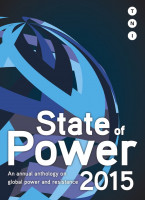Abstract
This essay discusses the different mining company influence strategies to gain community acceptance or a social license to operate from communities who are initially opposed to their projects. I provide examples of how mining companies via strategies such as CSR try to weaken and divide community movements opposed to their projects by making them more dependent on them. CSR therefore in circumstances of community rejection can be considered to be a manipulation tool to co-opt the community and win over a social license to operate.
I also illustrate how mining companies can exert their power on the government and State regulators, which is not surprising given we are in a neo-liberal globalized world with a shrinking State and growing corporate power. I finish by offering recommendations for community movements opposing the installation of any high impact projects in and around their territory.
Concluding remarks
Within the current dominant neo-liberal paradigm we can expect increasing levels of private sector funded large projects (such as extractives, natural resources based and infrastructure) to be approved by States and governments to operate on land belonging to indigenous people and rural based societies. Recent history has shown a rejection by indigenous and rural communities of these new projects being imposed on them as they represent a threat to their livelihoods, autonomy and identity.
The task facing such communities who decide to collectively resist these projects is a large one to say the least. These projects are sponsored by the State and executed by multi million or billion dollar enterprises. Governments, business and even certain NGOs frame such investment as being good for local development and poverty eradication due to the jobs and economic growth they can bring locally.
Therefore any collective resistance to such projects can be met with by physical force and harsh violence (Global Witness, 2014) and most certainly by counter mobilization strategies based around CSR and compensation aimed at breaking up the resistance movements and gaining a social license to operate. These corporate influence strategies can divide, dissolve and delegitimize the local opposition movements to the proposed projects.
As such community movements need to be well prepared to anticipate and face these tactics and also be organized enough to create national and international links to NGOs who can help create media campaigns to generate public support. Large multinational corporations are very sensitive to their image and reputation, it is something they guard and protect with all their might.
If the local community is genuinely in opposition to the proposed project then the movement should attempt to organize a local referendum ideally recognized by an external organization (Civil Society or ideally a State actor) aimed at deciding whether the project should go ahead as planned or be abandoned.
This question is essentially about the ability and right of local communities for self- determination and deciding its own local economic economy as opposed to having this imposed on them by the State authorities. Accepting a high impact mining project such as mining could easily wean the community off their traditional livelihood, their land and instead become dependent on mining for the few decades of exploration. It is difficult to see how the community could continue with the same identity and traditions if this were the case. This would appear to be the price to pay for globalization and neo-liberal capitalism.


